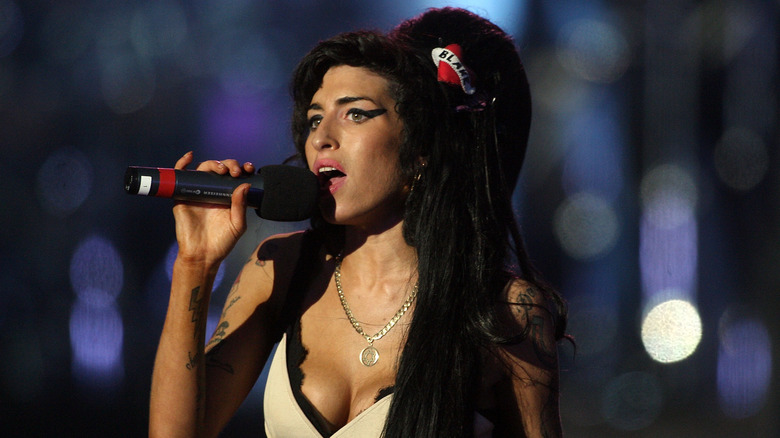What Is The 27 Club? Hollywood's Most Tragic Group Explained
The following article includes mentions of suicide and addiction.
On March 30, news broke that Chance Perdomo died in a motorcycle accident. The actor, who was known for his roles in "The Chilling Adventures of Sabrina" and "Gen V" (the popular spin-off of Amazon's hit series "The Boys"), was just 27 years old, making him the newest member of a deeply tragic cultural group known colloquially as "the 27 Club."
The idea surrounding the 27 Club got going in earnest during the 20th century when several prominent musicians died at the age of 27 under deeply sad circumstances, including struggles with addiction or suicide. Ever since the concept of the 27 Club was popularized, there's been a persistent myth that celebrities are more likely to die at 27, which doesn't have any actual basis in reality. (According to scientific studies, celebrities are more likely to die at the age of 56, which itself still feels dubious.) Still, it's devastating to see how many great talents have become a part of the 27 Club, and tragically, Perdomo joined it in 2024. So where have people heard about the 27 Club, and how did this cultural term come into being?
A string of tragic celebrity deaths in the 20th century sparked the idea of the 27 Club
Plenty of famous figures died at age 27 before the 1960s — but the idea of the 27 Club really took off when Rolling Stones guitarist Brian Jones, Janis Joplin, Jimi Hendrix, and Jim Morrison all died at that age. (Jones died in July 1969, Hendrix and Joplin in the fall of 1970, and Morrison in July 1971.) Even though all of their causes of death were vastly different — Jones drowned, Hendrix and Joplin due to complications from drug use, and Morrison from heart failure — it sparked the idea that celebrities usually die at the age of 27, and it should be said here that the coincidence of their ages at their time of death is quite eerie.
Years after those four passed away, two more high-profile figures died at 27. Artist Jean-Michel Basquiat died from a drug overdose in 1988 and Nirvana frontman Kurt Cobain died by suicide in 1994, sparking the idea of the 27 Club all over again. (Again, there were other "members" of the 27 Club in between, but these two men were among the most famous of them.) The superstition over the age of 27 was born anew, and seventeen years after Cobain's death, another beloved musician joined the "club."
The death of Amy Winehouse brought the 27 Club back into the vernacular
In July 2011, a bodyguard working for British singer Amy Winehouse struggled to wake the performer after she'd been drinking heavily; Winehouse was ultimately declared dead at her home in the Camden neighborhood of London. A coroner eventually revealed that her cause of death was alcohol poisoning, as her blood alcohol level was dangerously elevated. Winehouse was 27 years old, and murmurs about the 27 Club began all over again. ("Back to Black," a relatively controversial biopic starring Marisa Abela as the late singer, has been making waves lately and drawing critiques from fans for looking like a shallow take on Winehouse's life.)
Then, in June of 2016, young actor Anton Yelchin — best known for his role as Chekov in the modern "Star Trek" films — died in a car accident when his vehicle rolled and trapped him against both a pillar and a fence, furthering the concept of the 27 Club. Now, with Chance Perdomo's death at 27, the concept will gain traction once again. Ultimately, the only thing you need to know about the 27 Club is that the world has lost far too many talented people far too soon.
If you or anyone you know needs help with addiction issues, help is available. Visit the Substance Abuse and Mental Health Services Administration website or contact SAMHSA's National Helpline at 1-800-662-HELP (4357).
If you or someone you know needs help with mental health, please contact the Crisis Text Line by texting HOME to 741741, call the National Alliance on Mental Illness helpline at 1-800-950-NAMI (6264), or visit the National Institute of Mental Health website.
If you or someone you know is struggling or in crisis, help is available. Call or text 988 or chat 988lifeline.org


